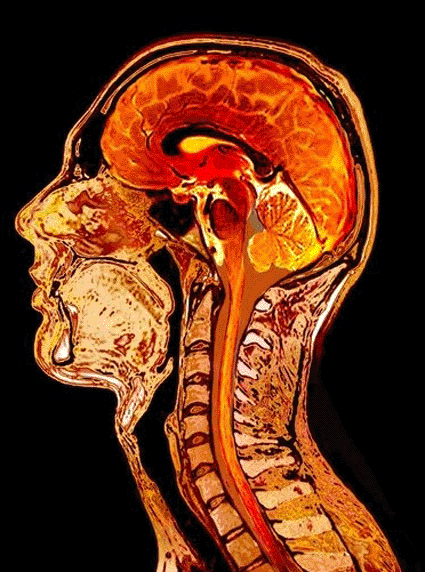Ultra-High-Field MRI Research Project Established to Study How the Brain Functions
By MedImaging International staff writers
Posted on 08 Mar 2011
A European imaging research project may soon provide more clues into how human brains function.Posted on 08 Mar 2011
Siemens Healthcare (Erlangen, Germany) received an order from Maastricht University (The Netherlands) for three high-performing magnetic resonance imaging (MRI) systems.

Image: Colored magnetic resonance imaging (MRI) scan of a normal brain (photo courtesy of Sovereign, ISM).
The MRI scanners are to be dedicated to the research project Brains Unlimited conducted by Maastricht University. How human brains work can become even less of a mystery in the near future, due to this sophisticated technology. "Now we can crack the code of the human brain,” explained Prof. Rainer Goebel, PhD, leader of the Brains Unlimited project at Maastricht University.
The three new MRI scanners at Maastricht University are a 3 Tesla and a 7 Tesla MRI system as well as one of the world's most powerful MRI systems with 9.4 Tesla. All systems will be used for research on the human brain. Currently, Siemens is the only company capable of supplying 9.4 Tesla MRI systems for human research. The ultra-high-field MRI system is considerably more powerful than a standard MRI system for clinical routine, and therefore, helps research scientists to detect more detail from inside the human body.
Researchers hope to gain insight into the causes of multiple sclerosis, Alzheimer's disease, Parkinson's, epilepsy, and tumor growth. Among additional research projects, the university plans to use the systems to investigate how the structure of musicians' ears differs from that of other people. The Brains Unlimited project is an initiative from the M-BIC (Maastricht Brain Imaging Center), under the leadership of Prof. Rainer Goebel, PhD. The M-BIC, part of the Faculty of Psychology and Neuroscience, works closely together with brain scientists at Maastricht University Medical Center. The project is funded by the European Union, the Province of Limburg, and the Municipality of Maastricht.
The order includes the construction of a special building to accommodate the three MRI systems, and it was one of the largest of this type in the history of Siemens Healthcare in the Netherlands.
Related Links:
Siemens Healthcare
Maastricht University














